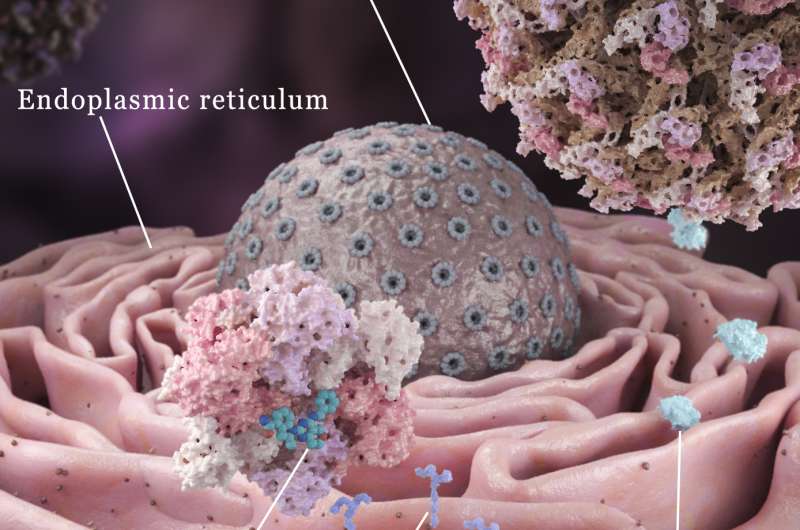Illustration showing how pharmaceuticals called VCP inhibitors enhance the therapeutic activity of cancer-killing M1 viruses. Credit: Haipeng Zhang, Guangmei Yan/Sun Yat-sen University
(Medical Xpress)—A team of researchers with members from several institutions in China has found that combining a VCP protein inhibitor with a virus that naturally targets liver cancer tumors made the virus much more potent. In their paper published in the journal Science Translational Medicine, the group describes their search for a way to improve the cancer fighting abilities of a natural virus, the protein inhibitor they found, and how well the two work together to kill cancer cells.
As scientists seek ways to prevent and treat cancer, they sometimes look for natural remedies, including viruses—some actually target and kill cancer cells and are called oncolytic viruses. One such virus, called simply M1, has been found to target hepatocellular carcinoma (HCC) cells which are involved with liver cancer, the second leading cause of cancer deaths in men. M1 is carried by mosquitoes and causes a minor horse illness. But it also seeks out HCC cells and kills them.
Unfortunately, its potency, like other oncolytic viruses, is too low to be of much use as a cancer treatment—it does not kill enough cancer cells to slow tumor growth. But it is good at seeking out HCC cells, which is why the team in China embarked on a study of small molecules that might help M1 kill more cancer cells. They looked at over 350 of them and found that one, Eeyarestatin I, which normally serves to inhibit the production of the protein VCP, had the effects the team was looking for. They created a compound that contained both the virus and the small molecules and found that when it was introduced into cancer cultures, M1 became approximately 3,600 times more potent.
The team next inoculated mice models and found that the M1 virus bolstered with Eeyarestatin I caused tumors to shrink, and in so doing, increased survivability. The team also tested the mix on monkeys and found nearly the same results. They have submitted a request to start a clinical trial for the compound and expect to begin testing in humans sometime next year.
More information: Haipeng Zhang et al. Targeting VCP enhances anticancer activity of oncolytic virus M1 in hepatocellular carcinoma, Science Translational Medicine (2017). DOI: 10.1126/scitranslmed.aam7996
Abstract
Oncolytic virotherapy is rapidly progressing through clinical evaluation. However, the therapeutic efficacy of oncolytic viruses in humans has been less than expected from preclinical studies. We describe an anticancer drug screen for compounds that enhance M1 oncolytic virus activity in hepatocellular carcinoma (HCC). An inhibitor of the valosin-containing protein (VCP) was identified as the top sensitizer, selectively increasing potency of the oncolytic virus up to 3600-fold. Further investigation revealed that VCP inhibitors cooperated with M1 virus–suppressed inositol-requiring enzyme 1α (IRE1α)–X-box binding protein 1 (XBP1) pathway and triggered irresolvable endoplasmic reticulum (ER) stress, subsequently promoting robust apoptosis in HCC. We show that VCP inhibitor improved the oncolytic efficacy of M1 virus in several mouse models of HCC and primary HCC tissues. Finally, this combinatorial therapeutic strategy was well tolerated in nonhuman primates. Our study identifies combined VCP inhibition and oncolytic virus as a potential treatment for HCC and demonstrates promising therapeutic potential.
Journal information: Science Translational Medicine
© 2017 Medical Xpress






















